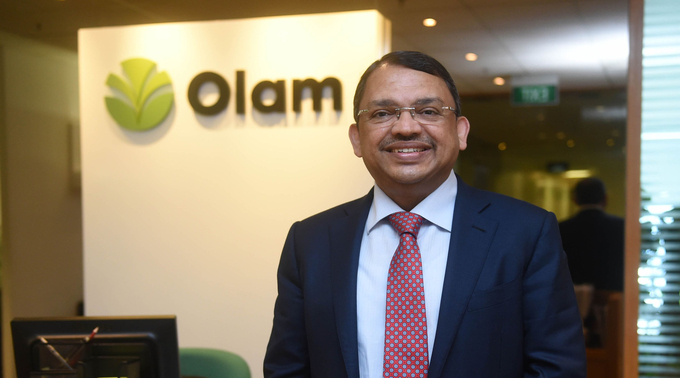May 17, 2025 | 01:54 GMT +7
May 17, 2025 | 01:54 GMT +7
Hotline: 0913.378.918
May 17, 2025 | 01:54 GMT +7
Hotline: 0913.378.918

Sunny Verghese, chief executive of Olam Agri.
"We have fought many wars over oil. We will fight bigger wars over food and water", said Sunny Verghese, chief executive of Olam Agri, a Singapore-based agricultural trading house.
Speaking at the Redburn Atlantic and Rothschild consumer conference last week, Verghese warned that trade barriers imposed by governments seeking to shore up domestic food stocks had exacerbated food inflation.
Big agricultural commodity traders, which reaped record profits in 2022 after the escalation of the Ukraine conflict and Western sanctions against Russia. The restrictions have resulted in some exports of grain and fertilizers being blocked, deepening food insecurity in poorer countries and exacerbating the cost-of-living crisis.
But Verghese argued that elevated food price inflation was in part the result of government intervention. A proliferation of non-tariff trade barriers in 2022 in response to the war — 1,266 from 154 countries by his count — had "created an exaggerated demand-supply imbalance", he said.
Wealthier countries were building up surpluses of strategic commodities, leading to exaggerated demand, and in turn higher prices, Verghese said.
"India, China, everybody has got buffer stocks", he said. "That is only exacerbating the global problem".
Food prices started to climb in the wake of Covid-19 and surged following Russia’s invasion of Ukraine as some exports of grain and fertilisers were blocked by the conflict. This deepened food insecurity in poorer countries and left consumers all over the world facing a cost of living crisis.
With this rise and climate change hampering agricultural production globally, governments are increasingly turning to protectionist policies.
In 2022, Indonesia banned palm oil exports to protect the local market while last year India imposed export restrictions on certain types of rice in an effort to curb rising domestic prices ahead of parliamentary elections, after a volatile monsoon disrupted production and spurred fears of a supply shortage.
"That was precisely the wrong thing", Verghese said. "You’re going to see more and more of that".
Olam Agri, which processes and supplies grains and oilseeds, edible oil, rice and cotton is part of the wider Olam Group. The food and agribusiness, which supplies ingredients, feed and fibre to global brands from Nestlé to Unilever, has had a difficult year.
The trader, which has a large footprint in Asia and Africa, was investigated by authorities in Nigeria last year after news reports claimed it was involved in a multibillion-dollar fraud. Shares in the company jumped in February when it was cleared of wrongdoing.
Olam Group was also forced to issue a profit warning for the first half of 2023. Even after a better second half, it reported a 56 per cent drop in full-year profits to S$278.7mn (US$205mn), blaming this on high interest rates and "exceptional losses" caused by low yields from its almond orchards in Australia.
The group said the slump in profits was partly the result of a lower contribution from Olam Agri, following the sale of a 35 per cent stake in the business in 2022 to a subsidiary of Saudi Arabia’s Public Investment Fund for $1.24bn. Olam Agri is 51 per cent owned by Singaporean state-owned investment company Temasek Holdings.
Olam Group has long-standing plans to float Olam Agri in Saudi Arabia, but these have been repeatedly delayed since the trading arm was split from its food ingredients business in 2020. Headquartered in London, Olam Food Ingredients is one of the world’s biggest suppliers of cocoa, coffee, nuts and spices.
Addressing the impact of climate change on global yields, Verghese urged the gathering of consumer industry executives, including the bosses of Coca-Cola and Associated British Foods, to "wake up" and take more action on climate change. Governments should charge a tax for carbon, he argued. "Carbon is free today, so we are polluting indiscriminately", he said.
(Financial Times)
![Multi-channel, multi-directional Vietnamese agricultural markets: [7] Deep processing makes global reach easy](https://t.ex-cdn.com/nongnghiepmoitruong.vn/608w/files/huytd/2025/05/16/2946-che-bien-sau-chia-khoa-vang-nang-tam-nong-san-viet-tren-ban-do-the-gioi-080603_110-093858.jpg)
(VAN) The application of deep processing technology is helping Vietnamese agricultural products enhance their value, create competitive advantages, and open doors to conquer global consumers.
![Multi-channel, multi-directional Vietnamese agricultural markets: [6] Agri products go online](https://t.ex-cdn.com/nongnghiepmoitruong.vn/608w/files/content/2024/12/10/1-113313_954.jpg)
(VAN) Bringing agri products onto e-commerce platforms is an effective way to build a brand that many businesses, cooperatives, and agricultural production households are doing.

(VAN) Veterinary training should focus on quality, not just quantity. Veterinarians also need more options to pursue specialized training.

(VAN) The veterinary industry needs to be viewed objectively and further invested in to properly demonstrate its role and importance in the new context.

(VAN) The number of veterinarians graduating each year is not enough to meet actual needs, hence a difficult problem for the growing livestock industry.

(VAN) The strategic partnership between Cambodia, the Philippines, Vietnam, and CGIAR ensures that innovative solutions effectively address national priorities for food system development.

(VAN) This was affirmed by the UK Minister of State at the Department for Environment, Food and Rural Affairs during a working session with Deputy Minister Tran Thanh Nam on May 13.